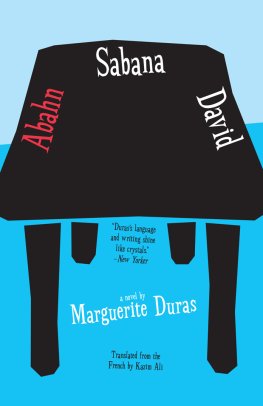Duras - Prison Journals During the French Revolution
Here you can read online Duras - Prison Journals During the French Revolution full text of the book (entire story) in english for free. Download pdf and epub, get meaning, cover and reviews about this ebook. year: 2014, publisher: Bronson Tweed Publishing, genre: Religion. Description of the work, (preface) as well as reviews are available. Best literature library LitArk.com created for fans of good reading and offers a wide selection of genres:
Romance novel
Science fiction
Adventure
Detective
Science
History
Home and family
Prose
Art
Politics
Computer
Non-fiction
Religion
Business
Children
Humor
Choose a favorite category and find really read worthwhile books. Enjoy immersion in the world of imagination, feel the emotions of the characters or learn something new for yourself, make an fascinating discovery.

- Book:Prison Journals During the French Revolution
- Author:
- Publisher:Bronson Tweed Publishing
- Genre:
- Year:2014
- Rating:3 / 5
- Favourites:Add to favourites
- Your mark:
- 60
- 1
- 2
- 3
- 4
- 5
Prison Journals During the French Revolution: summary, description and annotation
We offer to read an annotation, description, summary or preface (depends on what the author of the book "Prison Journals During the French Revolution" wrote himself). If you haven't found the necessary information about the book — write in the comments, we will try to find it.
Duras: author's other books
Who wrote Prison Journals During the French Revolution? Find out the surname, the name of the author of the book and a list of all author's works by series.
Prison Journals During the French Revolution — read online for free the complete book (whole text) full work
Below is the text of the book, divided by pages. System saving the place of the last page read, allows you to conveniently read the book "Prison Journals During the French Revolution" online for free, without having to search again every time where you left off. Put a bookmark, and you can go to the page where you finished reading at any time.
Font size:
Interval:
Bookmark:

| Note: | Images of the original pages are available through Internet Archive. See https://archive.org/details/prisonjournalsdu00dura |
DURING
THE FRENCH REVOLUTION.
| Page. |
| Prison Life during the French Revolution |
| Addenda |
| Madame Latour's Memoir |
| Events of the 21st of July, 1794 |
| Narrative of an Eye-witness of the Affair |
| of July 22, 1794 |
| Letter from Madame la Duchesse de Duras, |
| ne Noailles, to Monsieur Grelet |
| Extract from the 'Mmorial Europen,' |
| April 24, 1809 |
FRENCH REVOLUTION.
WRITTEN IN 1801, THE YEAR IX. OF
THE REPUBLIC.
Font size:
Interval:
Bookmark:
Similar books «Prison Journals During the French Revolution»
Look at similar books to Prison Journals During the French Revolution. We have selected literature similar in name and meaning in the hope of providing readers with more options to find new, interesting, not yet read works.
Discussion, reviews of the book Prison Journals During the French Revolution and just readers' own opinions. Leave your comments, write what you think about the work, its meaning or the main characters. Specify what exactly you liked and what you didn't like, and why you think so.








